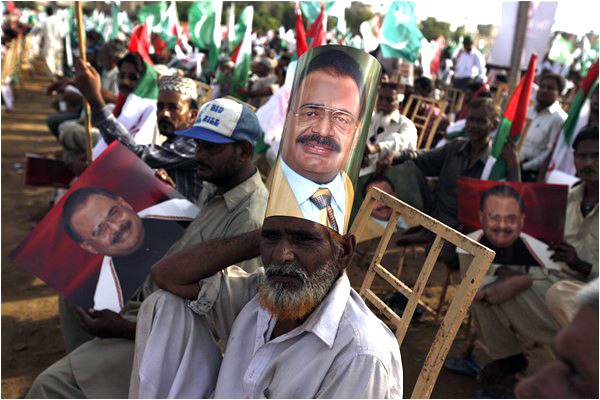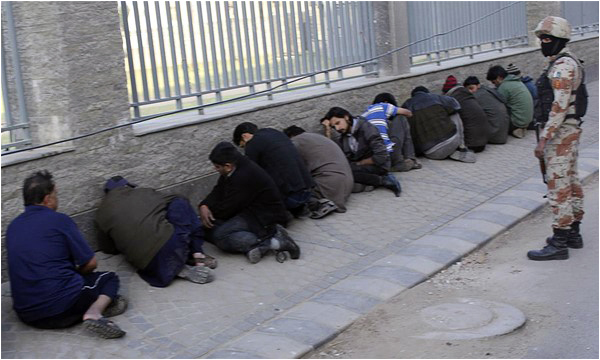
Operation Zarb-e-Azb has left the formidable Muttahida Qaumi Movement in tatters, so much so, that the very survival of the party is now in question. If the evolving demographics of Karachi and the rise of nationalistic patriotism among the youth were going to gradually reduce the party’s popularity over decades, state action in the last two years has definitely accelerated the process. One outcome of such a rapid unnatural death is the creation of a political vacuum in Karachi and urban Sindh, where alternate forces are not ready to replace a party that has unequivocally ruled over these parts for the last three decades.
Although Altaf Hussain’s faction of the MQM still enjoys voter support, it seems that the deep state is adamant about not allowing him to contest the elections—even under a different name or a new untarnished leadership. This decision appears to be an institutional one and likely to stick, as the change in leadership from Gen Raheel Sharif to Gen Qamar Bajwa did not bring any respite to MQM-Altaf. Farooq Sattar’s version of the MQM, on the other hand, is registered with the Election Commission and enjoys support from the state as well as most of the elected representatives of the party, including Wasim Akhtar, the mayor of Karachi. However, MQM-Sattar has so far been unsuccessful in attracting party workers and voters to its fold.

Even if Farooq Sattar’s faction succeeds in winning a few seats in the upcoming 2018 elections due to the absence of Altaf’s MQM, it is highly unlikely that it will be able to sustain popularity among the masses. The real strength of the MQM lies in the fact that Altaf Hussain maintains direct contact with the workers of the party and keeps rotating the mid-tier leadership to allow young blood from its worker base to rise in the ranks. Farooq Sattar, however, will always be obliged to the current mid-tier of the party, will continue to rely on their support, and is thus likely to sustain them at the expense of lower-tier party workers.
The lack of mass support will also weaken MQM-Sattar’s stance on local government. The current version of the Sindh Local Government Act has left the office of the mayor a ceremonial post without resources or authority. Given the Pakistan Peoples Party’s strong interest in the city, it take nothing short of a mass movement to force the provincial government to allow a meaningful devolution of power. Until that happens, Wasim Akhtar will remain a powerless mayor who will be blamed for all the problems of the city, further alienating the MQM voters.

Mustafa Kamal’s Pak-Sarzameen Party is a non-entity and does not deserve space in this conversation, unless the deep state blatantly flaunts election rules in its favour (which is highly unlikely). The conspicuous silence of the MQM-Haqiqi’s Afaq Ahmed in this entire saga, however, is curious. If I were in Afaq’s shoes, I would be offering Altaf Hussain to contest the elections through Haqiqi’s platform. If I were Altaf Hussain, I would want to use this option as a trump card near the elections to hoodwink the establishment.
This entire confusion is rendering the political future of Karachi increasingly uncertain. A situation in which a popular party is forbidden from contesting the elections and the alternate unpopular factions is being supported by the deep state will end up creating unforeseen problems that may be much larger than whatever the threat MQM-Altaf poses to the state and the city. The deep state’s interference in politics has never worked in the past, and will not work in the future. Short-term control over the city is unsustainable and likely to come at a much bigger cost. Karachi’s increasing socio-economic complexities and rapid demographic transformation should be given the time they demand to be solved through an open (and messy) political process.
The city’s masses have experienced political empowerment in the last three decades, and will not allow state control to perpetuate in the long run. As a result, suppressed electoral preferences will manifest themselves through other troubling means such as linguistic riots, sectarian altercations, or a rise in crime.
The political vacuum created by the suppression of MQM-Altaf will allow other organized players to emerge as important political forces in the city. One of these candidates, for example, is the Sunni Tehreek with its roots in the masses and an attractive populist ideology. Before Mustafa Kamal’s PSP took that role, the Sunni Tehreek was used by the state apparatus to launder the MQM workers as bulwark against the MQM’s street power. The Sunni Tehreek has thus inherited the MQM’s strong structural ethos with workers wielding the most control over the organization. While the MQM’s ideological appeal was confined to narrow ethnic populism, the Sunni Tehreek has the potential to attract support from all linguistic groups across Pakistan, especially in Azad Kashmir and northern and southern Punjab. Furthermore, the organization has access to substantial resources through the support of Karachi’s trader community. If the state is concerned about the MQM’s anti-national streak in Karachi, it should be more worried about the violent sectarian populism that may engulf the entire country.
In short, censoring the MQM-Altaf may sound like a great idea for now, but it will most likely backfire as such solutions are not sustainable and often lead to unimaginable consequences.
Obed Pasha is lecturer of Public Policy at the University of Massachusetts, Amherst. He can be reached at obedpasha@gmail.com or @ramblingsufi
Although Altaf Hussain’s faction of the MQM still enjoys voter support, it seems that the deep state is adamant about not allowing him to contest the elections—even under a different name or a new untarnished leadership. This decision appears to be an institutional one and likely to stick, as the change in leadership from Gen Raheel Sharif to Gen Qamar Bajwa did not bring any respite to MQM-Altaf. Farooq Sattar’s version of the MQM, on the other hand, is registered with the Election Commission and enjoys support from the state as well as most of the elected representatives of the party, including Wasim Akhtar, the mayor of Karachi. However, MQM-Sattar has so far been unsuccessful in attracting party workers and voters to its fold.

Even if Farooq Sattar’s faction succeeds in winning a few seats in the upcoming 2018 elections due to the absence of Altaf’s MQM, it is highly unlikely that it will be able to sustain popularity among the masses. The real strength of the MQM lies in the fact that Altaf Hussain maintains direct contact with the workers of the party and keeps rotating the mid-tier leadership to allow young blood from its worker base to rise in the ranks. Farooq Sattar, however, will always be obliged to the current mid-tier of the party, will continue to rely on their support, and is thus likely to sustain them at the expense of lower-tier party workers.
The lack of mass support will also weaken MQM-Sattar’s stance on local government. The current version of the Sindh Local Government Act has left the office of the mayor a ceremonial post without resources or authority. Given the Pakistan Peoples Party’s strong interest in the city, it take nothing short of a mass movement to force the provincial government to allow a meaningful devolution of power. Until that happens, Wasim Akhtar will remain a powerless mayor who will be blamed for all the problems of the city, further alienating the MQM voters.

Mustafa Kamal’s Pak-Sarzameen Party is a non-entity and does not deserve space in this conversation, unless the deep state blatantly flaunts election rules in its favour (which is highly unlikely). The conspicuous silence of the MQM-Haqiqi’s Afaq Ahmed in this entire saga, however, is curious. If I were in Afaq’s shoes, I would be offering Altaf Hussain to contest the elections through Haqiqi’s platform. If I were Altaf Hussain, I would want to use this option as a trump card near the elections to hoodwink the establishment.
This entire confusion is rendering the political future of Karachi increasingly uncertain. A situation in which a popular party is forbidden from contesting the elections and the alternate unpopular factions is being supported by the deep state will end up creating unforeseen problems that may be much larger than whatever the threat MQM-Altaf poses to the state and the city. The deep state’s interference in politics has never worked in the past, and will not work in the future. Short-term control over the city is unsustainable and likely to come at a much bigger cost. Karachi’s increasing socio-economic complexities and rapid demographic transformation should be given the time they demand to be solved through an open (and messy) political process.
The city’s masses have experienced political empowerment in the last three decades, and will not allow state control to perpetuate in the long run. As a result, suppressed electoral preferences will manifest themselves through other troubling means such as linguistic riots, sectarian altercations, or a rise in crime.
The political vacuum created by the suppression of MQM-Altaf will allow other organized players to emerge as important political forces in the city. One of these candidates, for example, is the Sunni Tehreek with its roots in the masses and an attractive populist ideology. Before Mustafa Kamal’s PSP took that role, the Sunni Tehreek was used by the state apparatus to launder the MQM workers as bulwark against the MQM’s street power. The Sunni Tehreek has thus inherited the MQM’s strong structural ethos with workers wielding the most control over the organization. While the MQM’s ideological appeal was confined to narrow ethnic populism, the Sunni Tehreek has the potential to attract support from all linguistic groups across Pakistan, especially in Azad Kashmir and northern and southern Punjab. Furthermore, the organization has access to substantial resources through the support of Karachi’s trader community. If the state is concerned about the MQM’s anti-national streak in Karachi, it should be more worried about the violent sectarian populism that may engulf the entire country.
In short, censoring the MQM-Altaf may sound like a great idea for now, but it will most likely backfire as such solutions are not sustainable and often lead to unimaginable consequences.
Obed Pasha is lecturer of Public Policy at the University of Massachusetts, Amherst. He can be reached at obedpasha@gmail.com or @ramblingsufi

